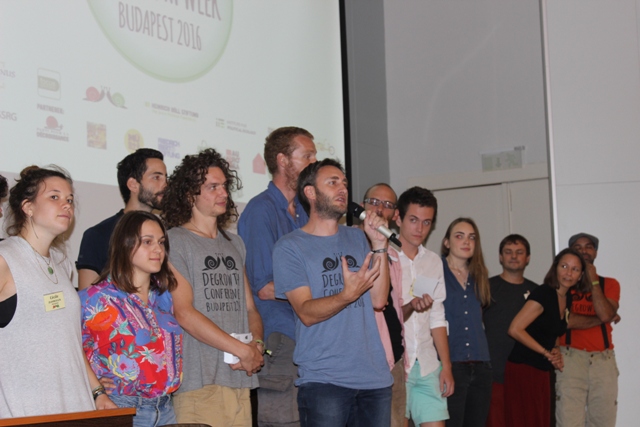In 2008, a few years after the birth of "décroissance" in France, we organized the first International Degrowth Conference for Ecological Sustainability and Social Equity in Paris. Only ten years later, in 2018, we promoted three large international events in the same year: the 6th International Degrowth Conference in Malmö - following Barcelona, Venice, Leipzig and Budapest – as well as a macro-regional bilingual event with the first South-North-Degrowth conference in Mexico City and a thematic one in the European Union (EU) Parliament in Brussels. It was a risky, but successful bet for our small networks. We can observe that degrowth starts to play an important role in a broad range of notable academic and political discussions.
What is degrowth?
“Generally degrowth challenges the hegemony of growth and calls for a democratically led redistributive downscaling of production and consumption in industrialised countries as a means to achieve environmental sustainability, social justice and well-being. Although integrating bioeconomics and ecological macroeconomics, degrowth is a noneconomic concept. On the one hand, degrowth is the reduction of energy and material throughput, needed in order to face the existing biophysical constraints (in terms of natural resources and ecosystem’s assimilative capacity). On the other, degrowth is an attempt to challenge the omnipresence of market-based relations in society and the growth-based roots of the social imaginary replacing them by the idea of frugal abundance. It is also a call for deeper democracy, applied to issues which lie outside the mainstream democratic domain, like technology. Finally, degrowth implies an equitable redistribution of wealth within and across the Global North and South, as well as between present and future generations.”
Demaria, F., Schneider, F., Sekulova, F., Martinez-Alier, J. 2013. What is Degrowth? From an Activist Slogan to a Social Movement. Environmental Values 22 (2013): 191–215.
Degrowth has emerged over the last 10 years. This “bomb word”, a provocation, has been used to open in-depth debates on whether infinite growth in a finite world is desirable or even possible. Degrowth first deconstructs the myth that growth is the central solution for the impasse our capitalist, productivist and consumerist societies have led us to. The movement coalescing around this concept tries to understand the convergence of the crises we are experiencing and argues that energetic, political and existential, economic and social, and various environmental crises like climate change are interconnected.
Our society’s “more and more” attitude and the push towards increased production and consumption is not sustainable as we are now facing rapid climate change, biodiversity loss, and the end of cheap and easy extraction and production of raw materials such as fossil fuels and metals – in particular the ones used in renewable energies. Our model of development has not been able to alleviate rising inequalities, unemployment and malnutrition. GDP growth or just a quantitative reading is far from implementing a meaningful and emancipating life for all. Degrowth considers in earnest the warnings about a potential collapse of the global thermo-industrial civilization and answers this by exploring alternative coherent solutions on different levels social organization.
Why the International Degrowth Conferences?
Apart from demonstrating the latest research in the field, the conferences aim to promote cooperative research, activism and art in the formulation and development of political proposals. With these international gatherings, we aim to offer a platform for dialogues that bring together a large diversity of people, who could be more or less degrowth. It is crucial that they accept to be challenged and to engage into in-depth dialogue to co-construct democratic and serene transitions toward new societies based on sustainability, social and environmental justice, open relocalisation, eco-feminism, conviviality, autonomy, etc. It is also an opportunity to raise visibility of these debates and ideas and to construct alliances between different movements and people from all over the world: global South-North dialogue, East-West cooperations, environmental and social movements, democracy and gender equality, individual and collective local actions and more academic, political global approaches, more rational and scientific thinking and artistic, cultural ways of communication.
A degrowth momentum?
There is an acceleration of history. A very hot summer stretched deep into northern hemisphere November, and inspired questioning deeper foundations of our societies. The latest IPCC report analysis on the situation is alarming. And degrowth is talked about in different contexts more than ever. All the Degrowth Conferences we supported this year were very successful and met a large public. 800 people in Malmö, 750 in Brussels and 350 in Mexico attended in person. Malmö offered the possibility to debate degrowth in the most developed European region oriented on green growth, and we could debate the limits and contradictions of such a strategy with local activists, researchers, politicians and citizens. Large investments in green technologies just move the problems out of sight and fail to reduce the global greenhouse gas emissions, while green growth approach increases inequalities. In Mexico City, we could connect with the Global South movements like anti-extractivist, indigenous rights, Via Campesina, and understand better the extent to which we should cooperate with each other. There is no chance for the Global South to re-establish self-determination without a radical degrowth in the Northern dependency on their resources. Finally, at the EU Parliament, under the politically sanitized name of post-growth, hosted by 10 MEPs from 10 countries and 5 political parties and co-organized with NGOs, Unions and the ‘European Commission technocratic bubble’, we could scale the intellectual gap between the society which is moving and the institutions firmly stuck in the growth paradigm of European industrial modernity. But, for the first time, we could confirm our legitimacy to participate in the debates, re-appropriate political institutions and in many instances encounter openness for dialogue.
Also, the day before the conference, we published in the print and electronic media in 20 European countries, and supported by over 200 researchers and activists across the EU, an open letter claiming that “the EU needs a stability and wellbeing pact, not more growth”. It had a large impact and is still debated today.
More than International Conferences
Group Assembly Process (GAP)
In the past year we have launched a worldwide survey for mapping the degrowth realities (people, movements, clubs, organizations, locations, digital collectives…). 114 organizations answered the call, with nearly 3,000 active people engaged, mostly located in Europe but also in North and South America, the Philippines, Tunisia, Turkey and other places. In August 2018, members of some of these groups met in person for the first time in Freetown Christiania (Copenhagen, Denmark). We exchanged good practices around ecological sustainability and social equity, discussed about the future of our societies, and initiated several Group Assembly Processes (GAPs) that became international working groups: activists and practitioners; researchers; politics; artists; collective actions; communication; education. These groups met throughout the subsequent 6th International Degrowth Conference, in Malmo, Sweden. Such groups want to provide opportunities for people around the world to engage in the degrowth movement locally as well as to disseminate degrowth (theoretically and practically).
More information
here and
here
A future to be reckoned with?
We are conscious that these conferences are far from sufficient to avert the challenges the world is facing. But we believe they provide a necessary and useful tool for expanding and diversifying a meaningful dialogue between all those who understand and want to engage with the said challenges.
The call to organize the next conference has been closed on 1st of December 2018. We received expressions of interest from different countries. There will be more and more international degrowth events, carried on the momentum of International Degrowth Conferences.
But, degrowth debates and experiments should happen everyday everywhere. More than ever we need spaces for open dialogue, we need radicality (tackling the problems at their roots) with openness, we need non-violent resistance, we need to occupy institutions, public debates, the media, as changes won’t come about without strong and large alliances. Our privileged position to have the means and knowledge to discuss planetary climate stability and material inequities provides us with the tools to see through the paralyzing enormity of the global inequalities and abrupt climate destabilization, by reshaping the myths that connect us to each other and to the living world. Beyond these myths lies the century that came about from a global understanding of the role that thermo-industrial complex played in the driving of climate change and the social organization of our aspirations and mutual interaction.
The knowledge and evidence for the shaping of the counter-narrative that emerges from the open dialogue equips the next generation with the emotions and words suitable for living in the long shadow of the Great Thermocene that brought us to the brink of collapse. They are tools of the last minute degrowth transformation that will spare the billions of the misery of violent and unalterable habitat destruction and other billions of the spirit-crushing drudgery of serving the societies captured by shallow economism. The Support Group for International Degrowth Conferences will continue to safeguard the gatherings through which to construct bridges, for communities to re-appropriate democracy free of the growth mania, for social and environmental justice and aversion of catastrophes in the transformation of global civilizations.
Follow us:
Twitter
https://twitter.com/Degrowth_info
FB
https://www.facebook.com/researchanddegrowth/
Newsletter
https://www.degrowth.info/en/newsletter/
Degrowth.info
Degrowth.net
About the author
The Support Group of the International Degrowth Conferences
A collective constituted by representatives of former degrowth conference organising committees. As of 2025: François Schneider (Paris), Brototi Roy and Federico Demaria (Barcelona), Jean-Louis Aillon, Silvio Cristiano, Mario Sassi, Michel Cardito (Venice), Gualter Baptista (Leipzig), Vincent Liegey, Alexandra Koves (Budapest), Ekaterina Chertkovskaya (Malmö), Mark Burton (Manchester), Mladen Domazet (Zagreb), Cristina Vázquez Santos, Mario Pansera, Brais Suárez Eiroa (Pontevedra), Elisabeth Veivåg Helseth, Erik Gomez-Baggethun (Oslo).
More from this author

